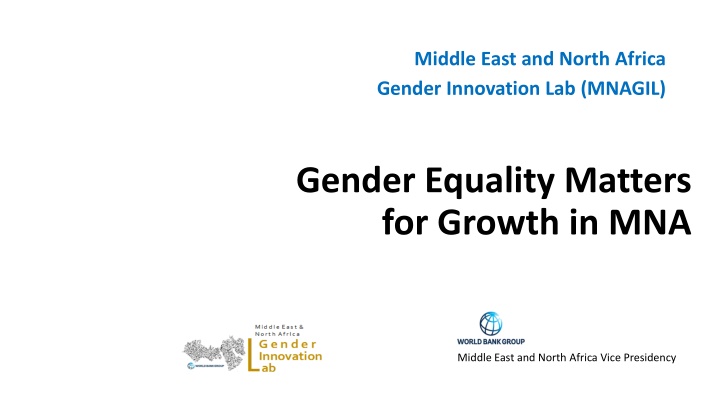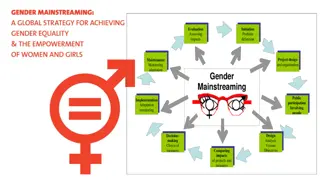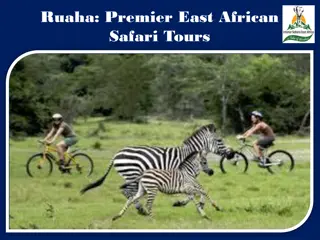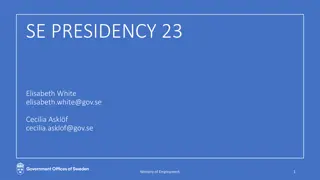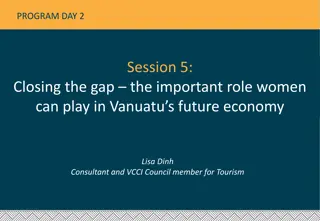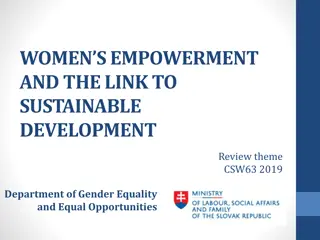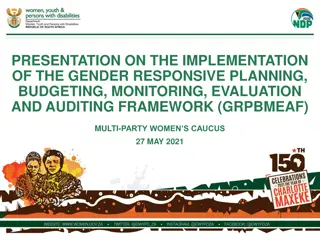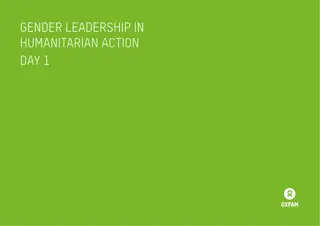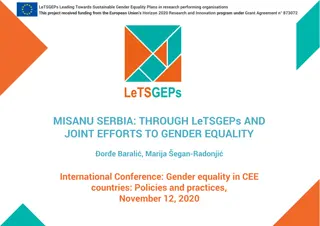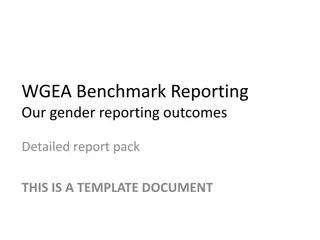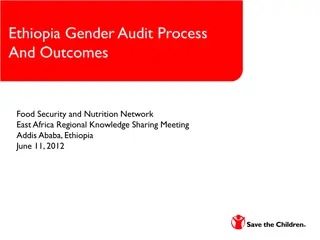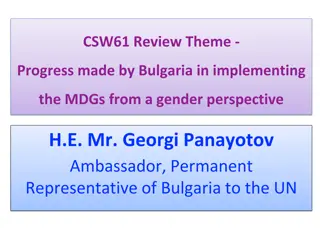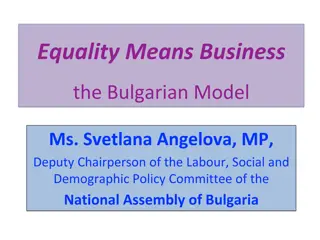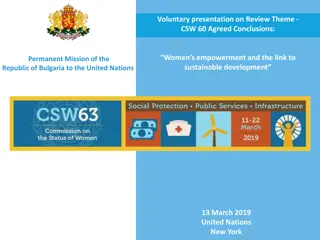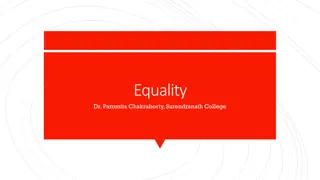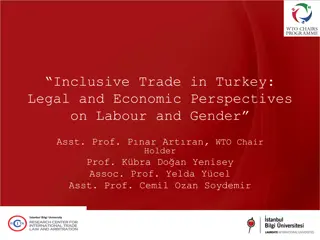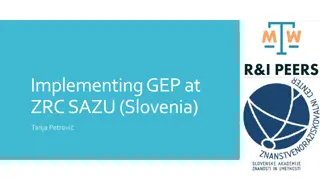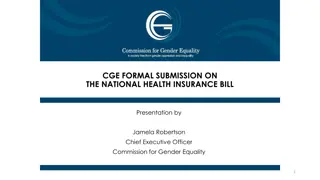Gender Equality and Economic Growth in Middle East and North Africa
This content highlights the Middle East and North Africa Gender Innovation Lab (MNAGIL) and its focus on addressing gender gaps in labor force participation, access to technology and financial services, asset ownership, and more. It emphasizes the economic impacts of gender equality in the region and the strategic objectives of MNAGIL to inform policy dialogue, engage with policymakers, and close gender gaps in outcomes through research and innovation.
Download Presentation

Please find below an Image/Link to download the presentation.
The content on the website is provided AS IS for your information and personal use only. It may not be sold, licensed, or shared on other websites without obtaining consent from the author.If you encounter any issues during the download, it is possible that the publisher has removed the file from their server.
You are allowed to download the files provided on this website for personal or commercial use, subject to the condition that they are used lawfully. All files are the property of their respective owners.
The content on the website is provided AS IS for your information and personal use only. It may not be sold, licensed, or shared on other websites without obtaining consent from the author.
E N D
Presentation Transcript
Middle East and North Africa Gender Innovation Lab (MNAGIL) Gender Equality Matters for Growth in MNA Middle East and North Africa Vice Presidency
MENA faces wide gender gaps in Labor force participation rate Access to digital technology Access to financial and digital payment services Assets ownership Legal provisions Wages Gender-based job restriction Source: World Bank Women in business
Economic Impacts of Gender Equality in MNA About of total regional GDP Source: UN Women,2016 https://www.cfr.org/interactive/womens-participation-in- global-economy/
World Banks Evidence for Policy Design Hub Evidence-based research to find what works and what does not to shape policies that increase women participation in the economy
Objective, strategic areas, and design How the lab works Where do we focus and how Overview MNAGIL in practice Middle East and North Africa Gender Innovation Lab (MNAGIL) Technical review process The overall approach
MNAGIL objectives Invest in a research agenda focused on how to increase women s access to economic, social and political opportunities Close gender gaps in outcomes Make key contributions to inform policy dialogue and bring innovations Seeks to be instrumental in engaging with policymakers in the region Encourage the use of evidence and learning for policy design, implementation, and reform
Strategic areas (3 As) Do Things Differently Delving into what works and what does not to generate knowledge and create smart evidence- based policy interventions A2 A1 A3 Accelerate access to financial capital, digital, and assets ownership Advance Advance women's workforce development agency and voice
How the lab works Rigorous evidence More than inform policy: research uptake = scaling up what works and scaling back or changing what does not Concrete policy advice to support moving from advocacy to action Partnerships government agencies, operations teams within the World Bank, NGO staff, donor staff in other agencies, private companies, and academics (global) Leverage: relatively small investment in building knowledge pays off in policy and project changes in Africa GIL so far $1 directly shifts $46 in development spending plus: policy changes, more $ for projects, scaling down ineffective projects, innovation with firms
Where do we focus and how Deliverables Country coverage published peer-reviewed research papers, open access data sets, innovative methodologies, systematic reviews of evidence, policy briefs and an online platform for compilation, dissemination and outreach Algeria, Iran, Iraq, Syria, Libya, Yemen, Egypt, Tunisia, Morocco, West Bank & Gaza, Lebanon, Jordan, and Djibouti, and countries of the Gulf Cooperation Council
MNAGIL in practice Two ways: Call for Expression of Interests Interested teams submit their EOIs and we will support to do an impact evaluation Work with WB projects in the first phase Offer a package of technical and financial support; top-up money for innovations 1. 2. 3. Opportunistically Active seeking out of projects and convincing them Work with DIME s gender team to find projects with potential IE and gender elements in MENA region 1. 2.
Technical Review Process Estimating the funding amounts; need-based assessment; and disbursement Pre-analysis plan and finalizing the deliverable (Evidence and paper review) First call for EOI by 15 May, 2019; forming MNAGIL s steering committee Concept Note (CN) Technical Review Expression of Interest (EOI) Reviews on EOIs Submit GFR for RVP approval Register IE projects Internal review for feasibility and relevance; steering committees decisions and comments on EOI Review on IE design and methodology, share feedback and finalize the teams for measuring the impact
Recap: How the lab works Understanding the underlying constraints Diagnosis and Synthesis Innovation Informing national policy dialogues Taking what works to scale
Only one IE project in MENA so far Title: Enhancing female entrepreneurship of vulnerable women through an unconditional cash grant (P164699); IE P code: kk8y45 TTL: Eric Mvukiyehe Country: Tunisia Global Practice: Social Protection; Pillar: Growth, Risk & Vulnerability Brief: Together with the Tunisian Ministry of Vocational Training and Employment, the World Bank supported the Community Works and Local Participation Project (CWLP), a pilot public works program in Jendouba, Tunisia; the objective is to generate evidence on gender impacts of a cash grants add-on to a public works program (PWP) in Tunisia Key intervention: To provide cash to unemployed workers through short-term employment opportunities Theory of Change: IE investigates the effects of deepening the CWLP project by offering small business grants to a random sample of female participants after finishing with CWLP to invest in a livelihood activity such physical, or human capital
Learn more: http://www.worldbank.org/en/programs/mena-gender-innovation- lab#1
